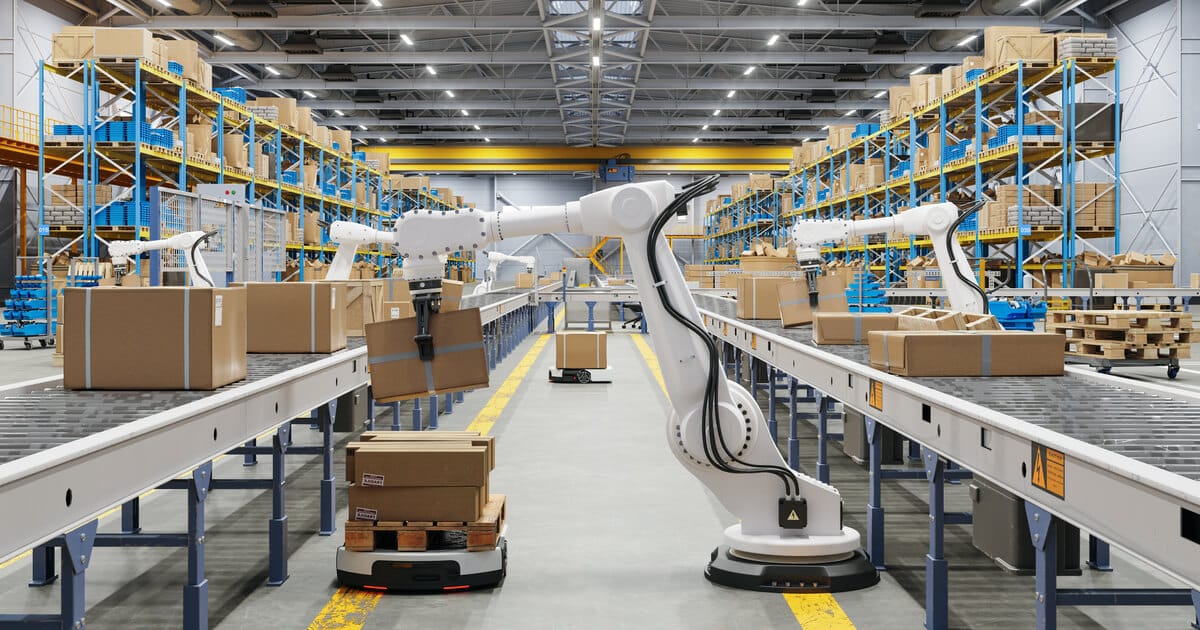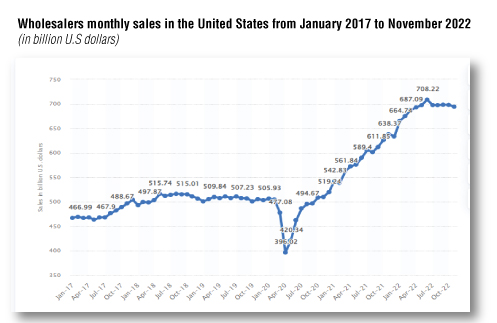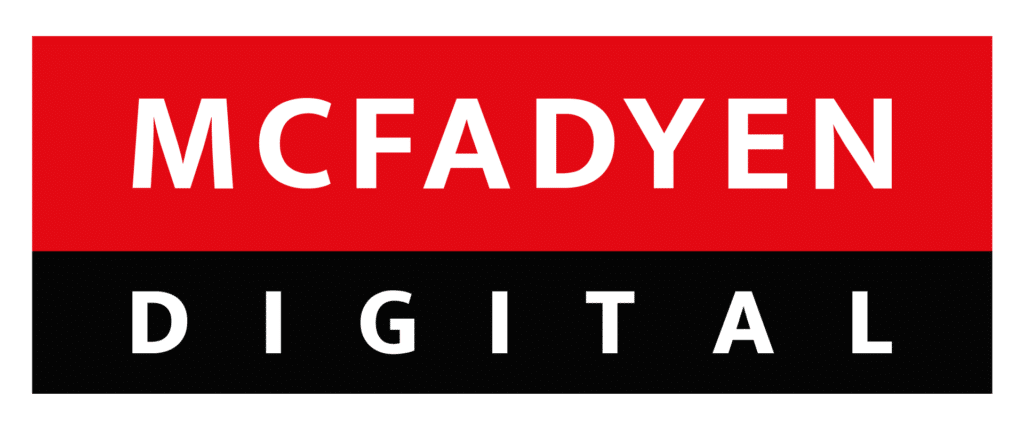
How traditional wholesaler distributors can leverage unique advantages while rapidly transforming their digital commerce capabilities to combat the rising threat of online-only pure play distributors.
The Growing Landscape of Wholesale Distribution

Wholesaler’s monthly sales in the US from January 2017 through November 2022 shows some quarter-to-quarter volatility, but a massive growth pattern that has continued through 2023 into 2024.
The wholesale distribution industry is a cornerstone of the global economy, with a market size exceeding $11 trillion globally in 2023. In the United States alone, wholesale distribution generated revenues of over $8 trillion annually, representing a critical link in the supply chain between manufacturers and businesses. Similarly, the DACH region (Germany, Austria, Switzerland) plays a significant role, contributing billions to the European economy. Wholesale distribution within these regions is not only about scale; it’s about maintaining the balance between efficient supply chain management and the evolving expectations of modern customers.
In recent years, traditional distributors are facing a new wave of competition: pure-play online distributors. These online-only players are shaking up the industry by providing a modern, frictionless buying experience akin to high-end consumer sites, leaving the classic B2B buying experience feeling outdated and sluggish. For traditional distributors, adapting to these changes is no longer optional—it’s essential for survival and growth.
Traditional vs. Pure-Play Online Distributors
The traditional wholesale distributor model typically revolves around large inventories, established customer relationships, and a strong network of logistics capabilities. These businesses often excel at building personal relationships, offering custom terms, and providing a wealth of industry knowledge. However, traditional models often struggle with cumbersome purchasing processes, limited payment options, and a lack of intuitive digital experiences.
On the other hand, pure-play online distributors are leveraging the best of modern technology to attract customers with seamless experiences. These companies provide easy-to-use interfaces, multiple payment methods, transparent pricing, and quick fulfillment—features that are increasingly expected by today’s business buyers. The ability to provide a B2C-like experience in a B2B context has been the core strength of these players.
Profiles of Successful Pure-Play Online Distributors
The following pure-play online distributors have carved out notable success by delivering exceptional customer experiences and leveraging technology to streamline the purchasing process.
- WebstaurantStore: Founded in 2004, WebstaurantStore is a leading distributor for the foodservice industry, providing everything from equipment to consumables. Known for its wide range of inventory and highly intuitive ordering platform, the company has grown rapidly, now employing over 3,000 people. Their success is driven by their deep understanding of the foodservice industry’s needs, competitive pricing, and a commitment to fast, reliable shipping. The company’s online experience includes detailed product descriptions, customer reviews, and robust support, making it easy for businesses to find exactly what they need.
- Stockd: Stockd is an online-only marketplace created by Premier Inc. to serve healthcare professionals. Since its founding in 2019, Stockd has aimed to bring a simplified B2B buying experience to the medical supplies industry, offering transparent pricing and a highly efficient procurement process. Stockd’s marketplace model allows healthcare providers to compare and purchase products quickly, cutting down on traditional procurement complexities. Its ability to offer a streamlined experience tailored to healthcare professionals has helped it win new customers looking for efficiency and reliability.
- Faire: Founded in 2017, Faire serves as a wholesale marketplace for independent retailers and brands. The company boasts a robust network of over 700,000 retailers and brands, offering net 60 payment terms and free returns, which have helped Faire scale rapidly. Faire’s approach focuses on helping small retailers thrive by offering risk-free inventory options and personalized product recommendations through data-driven insights. By making it easy for small businesses to discover unique products and offering favorable payment terms, Faire has managed to build a strong community that benefits both brands and retailers.
- DHGate: DHGate is a well-established platform founded in 2004, connecting global sellers to buyers across industries. It provides an extensive catalog of products, competitive pricing, and a strong presence in the international B2B ecommerce space, making it a popular choice among small and medium-sized businesses. DHGate’s platform is built to accommodate global trade, providing language support, currency conversions, and logistical solutions that facilitate cross-border transactions. Their strength lies in their ability to connect buyers with a vast array of suppliers, offering a diversity of products at competitive prices.
- Zoro.com: Founded in 2011, Zoro.com is an online-only distributor that serves a wide range of industries, including manufacturing, electrical, plumbing, and maintenance. Zoro is a subsidiary of W.W. Grainger, leveraging Grainger’s supply chain expertise while maintaining the agility of an independent, digital-first business. Zoro’s success is driven by its commitment to simplifying the purchasing process for small businesses by offering transparent pricing, no minimum orders, and fast shipping. The user-friendly platform allows customers to easily find and purchase from over 10 million products, making Zoro a go-to choice for businesses seeking convenience and variety.
- Amazon Business: Launched in 2015, Amazon Business has quickly become a major player in the B2B space. Leveraging Amazon’s vast logistics network, Amazon Business offers business pricing, multi-user accounts, and a wide selection of products across virtually every category, with reported annual sales exceeding $25 billion by 2023. Amazon Business excels at providing a familiar consumer-like experience, complete with rich product details, customer reviews, and personalized recommendations. The platform also integrates procurement tools that help businesses manage spending and streamline purchasing, giving Amazon Business a significant advantage in meeting the needs of modern B2B buyers.
How Traditional Wholesale Distributors Can Compete
While the emergence of these online-first distributors poses a challenge, it also presents a unique opportunity for traditional distributors to evolve. By modernizing their ecommerce capabilities and focusing on providing a seamless buying experience, traditional wholesalers can leverage their long-standing industry expertise and logistical strengths to compete effectively.
- Enhance Digital User Experience: Traditional distributors must invest in improving their digital touchpoints. This includes a user-friendly website, robust search and filtering options, mobile optimization, and easy checkout processes—features that customers have come to expect from their interactions with consumer websites. Leveraging advanced personalization techniques, such as tailored product recommendations and targeted promotions, can further enhance the overall experience, keeping users engaged and increasing conversion rates.
- Offer Multiple Payment Options: B2B buyers want the same convenience they experience as consumers. Offering a variety of payment options, including credit cards, net payment terms, digital wallets, and even financing options, is key to staying competitive. By integrating multiple payment gateways, traditional distributors can provide more flexibility, reduce friction at checkout, and appeal to a broader customer base.
- Leverage Existing Strengths: Traditional players have deep relationships, extensive industry knowledge, and robust logistical capabilities that new entrants can’t easily replicate. By combining these strengths with a modern digital storefront, traditional distributors can offer the best of both worlds—a trusted partner with a sophisticated purchasing experience. Offering value-added services such as consulting, technical support, and customized fulfillment options can further differentiate traditional distributors from pure-play online competitors.
- Adopt Modern Ecommerce Platforms: Implementing a modern ecommerce solution like Adobe Commerce, BigCommerce, commercetools, or Shopify can provide the flexible infrastructure needed to deliver these enhanced experiences. These platforms offer scalability, customization, and integration capabilities that help distributors adapt quickly to changing market conditions and customer needs. Leveraging these platforms allows traditional distributors to incorporate advanced features such as real-time inventory updates, AI-driven customer service chatbots, and easy integration with third-party logistics providers.
- Focus on Omnichannel Engagement: Traditional distributors can also take advantage of omnichannel engagement strategies to stay competitive. This includes integrating online and offline channels to provide a seamless experience—whether a customer is ordering online, speaking to a sales representative, or visiting a physical location. By providing consistent and integrated touchpoints across all customer interactions, traditional distributors can meet the expectations of modern buyers who value convenience and flexibility.
- Data-Driven Decision Making: Leveraging data analytics to understand customer behavior and optimize business processes is another key advantage. By analyzing purchase patterns, customer feedback, and market trends, traditional distributors can identify opportunities for improvement, personalize the buying experience, and anticipate customer needs. Implementing data-driven strategies allows traditional distributors to be proactive rather than reactive, ultimately delivering a more compelling value proposition.
The Time for Transformation is Now
The competitive landscape for wholesale distribution is rapidly evolving, and the rise of online-only distributors is just the beginning. To maintain market share and capitalize on growth opportunities, traditional distributors must embrace ecommerce transformation. This means investing in the right technology, upgrading their digital experience, and offering the features that today’s buyers demand.
McFadyen Digital has the expertise to guide wholesale distributors through this transformation. Our experience with implementing modern ecommerce platforms like Adobe Commerce, BigCommerce, commercetools, and Shopify enables us to craft solutions that are fit for purpose and ready for the digital age. Reach out to us today at info@mcfadyen.com to learn how we can help your organization stay competitive and thrive in this changing landscape.
Sources:
- Statista, 2024, “Global Wholesale Trade Revenue.”
- U.S. Census Bureau, 2023, “Monthly Wholesale Trade: Sales and Inventories.”
- Eurostat, 2024, “Wholesale Trade Statistics by Region.”
Related Articles
Turn Insight Into Impact.
Start Today.



